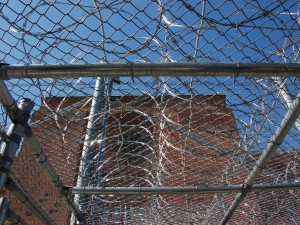By Anthony Davis. Reprinted from Solitary Watch.
The following essay was written by Anthony Lamar Davis, who has spent approximately six of his past eleven years in prison in solitary confinement in New York’s “Special Housing Units,” or SHUs. In 2008, New York passed a law restricting the use of solitary on people with serious mental illness. The “SHU Exclusion Law” has removed several hundred people from isolation and placed them in alternative mental health units. It has also been criticized for being too narrowly focused and easy to circumvent. Here, Davis points out an additional shortcoming of this and all laws and regulations that focus only on people with an underlying mental health diagnosis. As he notes, solitary confinement itself causes such severe psychological damage that it often renders individuals incapable of functioning effectively in the general prison population. Thus begins a vicious cycle in which such individuals, who receive little or no support making the transition to general population, land back in solitary once again. Anthony Davis welcomes letters, and can be reached at: Anthony Davis, 04-A-3293, Green Haven Correctional Facility, P.O. Box 4000, Stormville, New York 12582-4000.
. . . . . . . . . . . . . . . . . . . . . . . . .
I have noticed how Politicians and prisoners’ rights advocates have been advocating for changes in how the Department of Corrections and Community Supervision handles prisoners in long-term solitary confinement. There has been an outcry from these groups regarding the lengthy amount of time being imposed on those sanctioned to solitary confinement, the treatment of prisoners, and the psychological effects of long-term solitary confinement. As a prisoner who has spent a substantial amount of time in long-term solitary confinement, I obviously am an advocate of anything that limits the amount of time that a prisoner has to be subjected to extreme isolation.
I am a witness of its torturing ways and have been greatly affected by them. I’ve screamed for help, only to be ignored, and, in some cases, laughed at by the very people who I have asked for help. Unfortunately, the prison culture doesn’t provide the necessary tolerance for people with mental illness, so, I have been alienated by both, the prisoners as well as the authorities and that gives me a sense of hopelessness and loneliness, which enhances my psychological reactions which derived from spending years in solitary confinement.
The extreme sensitivity that I have been experiencing as a result of being isolated for substantial amounts of time has increased my rage. I often find myself wanting to hurt people for minor things – and had I not been in solitary confinement, I am confident that I would have done just that. With me, there is no frustration; only raging anger. I was not like this prior to me being placed in solitary confinement, and that is scary because the types of thoughts I have when I am angry are not conducive to my desire to do well and remain positive.
What’s more is that the inability to control myself could have disastrous results. Solitary Confinement has made me impulsive to the point where I have begun to feel like I am fighting a war with myself. The understanding I have for what extreme isolation has done to me is not necessarily advantageous towards me fighting the psychological damage. What it does is creates two versions of myself: On one end, I try to fight the other version of me, which is the one who has succumbed to what the results of long-term solitary confinement has to offer. I try to use the power of knowledge and information to fight these demons, but it’s the other version of myself who wins out usually. It becomes difficult for me to apply the information that I have researched because my mind has already been manipulated by the effects of extreme isolation.
For every time that I have been subjected to extreme isolation, my mental health deteriorated upon my release back into general population, and the more I am subjected to that type of inhumane torture, the worse I become. For example, just this past April I was reintegrated back into general population after an eleven month stint in solitary confinement. While in solitary confinement, I realized that I had completely lost control of myself and had basically become a walking time bomb ready to explode at the slightest provocation. I even suggested to my therapist that I be given more time in solitary confinement because I knew that I was not ready to be reintegrated back into general population. Of course, there was no way that he could accommodate my request, but the point is that I understood the mental metamorphosis that was occurring in me and I feared that I would end up doing something that could possibly jeopardize my life and freedom – which goes back to me fighting a war with myself because a part of me wants to live and be free, but another part of me wants to die and be free.
Almost immediately upon my reentry into general population I felt out of place; like I didn’t belong. I exhibited anti-social behavior along with a very negative attitude and aggressive behavior towards both prisoners and correction officers. The proverbial time bomb had begun ticking and there was no chance of defusing the potential explosion. My pleas for help from mental health staff during my time in solitary confinement went unanswered and what I was experiencing was the results of those unanswered pleas. It was as if I was ready to unleash all of my frustration at any moment on anybody. Not to mention, the fact that there was a lot going on in my personal life between my children and I, and being that I was psychologically damaged from spending time in a long-term solitary confinement, my whole perspective had changed. So I could not even evaluate the situation with my children in a logical manner. I responded to everything with rage and fury
As of today, I have been placed back in solitary confinement resulting from a physical altercation between myself and the authorities. I was not the aggressor in this incident, but I do believe that my negative attitude had contributed to me being assaulted. Unfortunately I was unable to adjust to general population and I am now back in the place where the foundation of my psychological damage derived from after only about five months in general population. During my brief stay in general population, I expressed to my therapist countless times that I was having a difficult time adjusting and needed help. Though I had not known what it was exactly that I needed help with. I did know that something was going terribly wrong inside of my mind because, not only did my way of thinking change but so did my behavior.
But with all of these programs put in place for solitary confined prisoners who have been diagnosed as having a serious mental illness (i.e., Residential Mental Health Unit, Special Treatment Program, Behavior Housing Unit, and Correctional Alternative Rehabilitation), I have to wonder what happens to the prisoners such as myself who suffers from the psychological effects of being in long-term solitary confinement. It is apparent that there is no regard for prisoners like me, so when we are done with our time in solitary confinement, we are thrown back into general population and basically told not to get into any more trouble without regard for the psychological damage that has affected us associated with extreme isolation.
So it becomes a cycle; each turn more severe than the previous one, meanwhile, the time spent in long-term solitary confinement increases as my mental health deteriorates. No one seems to care about the difficulties of adjusting to general population despite the vast amount of people who claim to understand the psychological effects of long-term solitary confinement. I can only hope that my pleas are heard and some type of action is taken before it is too late.



Follow the #HALTsolitary Campaign